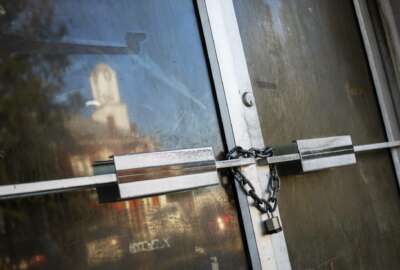

The House Appropriations Committee's draft spending bill sets aside $6 billion to modernize federal buildings and moves the Department of Homeland Security one step...
Members of the House Appropriations Committee have given several federal building projects priority in an early draft of the fiscal 2021 spending bill.
The committee’s draft spending bill for financial services and general government funding sets aside $6 billion to modernize federal buildings and moves the Department of Homeland Security one step closer to a consolidated campus in the Washington, D.C., metro area.
The spending bill also gives the IRS requested funding to improve taxpayer services, but also outlines congressional resistance to redefine delivery standards for the Postal Service.
Here’s a look at what the FY 2021 spending bill would give to federal building projects:
The bill would give the General Services Administration $200 million for further construction at the Department of Homeland Security’s consolidated headquarters at the St. Elizabeths West campus.
The campus, the most ambitious federal building project since the Pentagon, accommodates several thousand DHS employees. DHS held a ribbon-cutting ceremony last year for the pre-Civil War Center Building, which includes offices for acting DHS Secretary Chad Wolfe.
Despite these recent developments, construction of the campus has dragged on for more than a decade. Congress has given DHS and GSA less than half of what they have requested over the lifecycle of the project, which has delayed some phases of construction and revisions of the master plan for the campus.
This Thursday, GSA will present its latest master plan for the campus to members of the National Capital Planning Commission.
While DHS expected the St. E’s campus would allow the agency to move out of office space stretched across the Washington metro area, agency components facing lease deadlines have been put in a difficult position.
DHS received $120 million last year to build a new headquarters building for the Federal Emergency Management Agency, but FEMA has walked away from that plan in favor of a “long-term” lease in its current D.C. location or moving to the GSA-owned National Capital Region building.
Del. Eleanor Holmes Norton (D-D.C.) proposed funding for the St. E’s campus in coronavirus emergency spending bills, but that provision hasn’t made it through to the final version of these bills.
The FY 2021 spending bill would give GSA more than $9 billion in total for federal real property. That funding would go toward property management and maintenance, protection of federally owned and leased buildings, restoration and repairs, and construction and cleaning contracts for federal office space. More than $585 million would go toward repairs and alternations.
More than $9 million of GSA’s real property spending would redevelop the Southeast Federal Center.
Congress in 2000 passed the Southeast Federal Center Public-Private Development Act, which authorized GSA to redevelop the area through private partnerships “to enhance the value of the site to the federal government.”
The 53-acre site includes the Transportation Department’s headquarters that GSA had leased for years, but purchased last year for $760 million. It also includes a 42-acre parcel of land under redevelopment by Forest City Washington.
The spending bill would also give the Public Buildings Reform Board $3.5 million to oversee the 2016 Federal Assets Sale and Transfer Act. It would also give GSA $16 million for the sale, transfer or disposal of these properties.
The board, as required by FASTA, recommends putting a dozen high-value but underutilized federal properties up for sale. Those include a 73-year old archive and records center in Seattle, a former missile site in Gaithersburg, Maryland, and a fisheries science facility built to withstand the strongest earthquakes in California.
The spending bill would also stand up a Commission on Federal Naming and Displays.
Within 180 days of the spending bill going into effect, the commission would submit to the president and Congress a list of federal property names, monuments, statues, public artworks and historical markers the commission identifies as “inconsistent with the values of diversity, equity and inclusion.”
Within 180 days of the spending bill going into effect, the commission will hold at least two public meetings and determine whether properties on its shortlist should be renamed or removed.
The Congressional Research Service in 2017 found the Army has 10 major installations named after Confederate leaders, and has jurisdiction over Arlington National Cemetery, which contains a section for Confederate graves.
Meanwhile, the committee’s draft of the legislative spending bill would direct the Architect of the Capitol to remove Confederate statues from the halls of Congress.
While Postal Service watchdogs have called on Congress to redefine the agency’s universal service obligation to deliver mail to every address in the U.S. six days a week, language in the spending bill would keep those delivery standards in place.
The spending bill would also prohibit the closure of small, rural post offices.
The bill would also give the Postal Regulatory Commission $18.6 million, falling somewhat short of the administration’s request for $19.2 million.
While a line item in the congressional spending bill, the PRC’s budget comes from USPS revenues. PRC Chairman Robert Taub has been a leading voice for long-term postal reform, and has recommended Congress revisit the agency’s universal service obligation as a starting point.
Lexington Institute Senior Fellow Paul Steidler on Tuesday urged Congress to fully fund the administration’s request for the PRC’s budget.
“Congress should do the heavy lifting of comprehensive reform over the next 12 months,” Steidler wrote Tuesday. “Until then, the role of the Postal Service’s regulators — its Board of Governors, Office of Inspector General and the Postal Regulatory Commission — are more important than ever.”
Copyright © 2025 Federal News Network. All rights reserved. This website is not intended for users located within the European Economic Area.
Jory Heckman is a reporter at Federal News Network covering U.S. Postal Service, IRS, big data and technology issues.
Follow @jheckmanWFED



